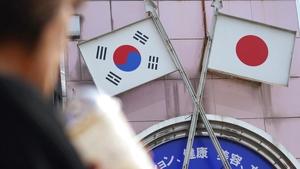 In this file photo dated Aug 2, 2019, a woman walks past an advertisement featuring the national flags of South Korea (left) and Japan at a shop in Shin Okubo area in Tokyo. (PHOTO / AP)
In this file photo dated Aug 2, 2019, a woman walks past an advertisement featuring the national flags of South Korea (left) and Japan at a shop in Shin Okubo area in Tokyo. (PHOTO / AP)
SEOUL - South Korea's industry ministry said Monday that it decided to suspend its trade dispute with Japan at the World Trade Organization (WTO) while consultations go on about Tokyo's export curbs on Seoul.
The Ministry of Trade, Industry and Energy said in a statement that the governments of South Korea and Japan agreed to continue consultations on pending bilateral issues related to Japan's export curbs on South Korea in a bid to return to their previous state before July 2019.
The South Korean government decided to halt the WTO dispute settlement process while the consultations go on.
In July 2019, Japan imposed tighter control over its export to South Korea of three materials, vital to make memory chips and display panels that are the mainstay of South Korea's export
The Japanese side decided to hold the export management policy dialogue with South Korea soon, the statement noted.
ALSO READ: S. Korea, Japan near landmark deal on wartime labor dispute
In July 2019, Japan imposed tighter control over its export to South Korea of three materials, vital to make memory chips and display panels that are the mainstay of South Korea's export.
In August of the same year, Japan dropped South Korea off its whitelist of trusted trading partners that are given preferential export procedures.
In response, Seoul removed Tokyo from its whitelist of trusted export partners the following month, filing a petition with the WTO against Japan's export restrictions.
Japan's export curbs came in protest of the South Korean top court's rulings in 2018 that ordered some of Japanese companies to pay reparation to the South Korean victims who were forced into hard labor without pay during World War II.
READ MORE: Japan, S.Korea foreign ministers stress return to 'healthy' ties
Earlier in the day, South Korea announced its plan to compensate the forced labor victims through a private sector-funded foundation rather than direct payment by responsible Japanese companies.


